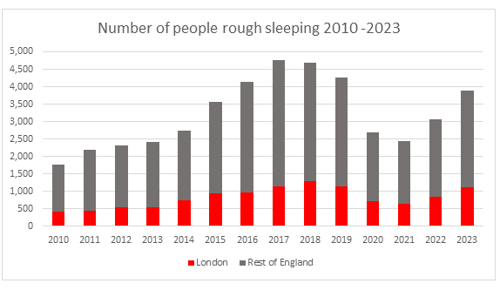Rough sleeping in England has risen by 27% but we have an opportunity to set this right

29.02.2024
The rise in rough sleeping in England, marked by the annual rough sleeping figures published today, sadly comes as no surprise. At Crisis over the last 12 months our services have seen significant increases in people approaching us for help who have been forced onto the streets because they have no other option. This is a worrying trend also experienced by many councils and voluntary sector services up and down the country.

The Government’s annual rough sleeping snapshot shows 3,898 people were sleeping rough across England, an increase of 27% on the previous year. This is the second year in a row that the government has reported an increase in rough sleeping and the sharpest rise over a 12-month period since 2015. The figures also show that street homelessness is rising among women with 568 seen to be rough sleeping last autumn, up from 464 – a rise of 22%. UK nationals remain the biggest proportion of people found to be sleeping rough (62%). These figures further confirm that the Westminster government will fail to meet its commitment to end rough sleeping by 2024.
Whatever your views on whether the statistics represent a true picture of scale, they are at the very least an accurate indicator of trends - and in this case things are very much going in the wrong direction.
In 2022, the Government renewed its target to end rough sleeping by 2024. While ambitious, at the time it felt achievable and was certainly welcome. During the pandemic we saw levels of rough sleeping almost halve in 12 months and the Government have continued to fund important initiatives through the Rough Sleeping Initiative and other programmes. We have seen rough sleeping decrease rapidly in the UK before. The work of the Rough Sleepers Unit from 1999 onwards saw rough sleeping levels reduce by two thirds in three years. Many of us have seen and played a part in what can be achieved when there is political will, the right policy solutions and other parts of the system are set up to prevent homelessness, not cause it.
Rough sleeping is the end point of a series of missed opportunities to prevent homelessness from happening in the first place. Often people experience other forms of homelessness first or are in contact with services regarding related issues that can increase the risk of homelessness. So, to truly end rough sleeping, we need to tackle all forms of homelessness.
So why do we find ourselves once again in a situation where more and more people are forced into the dangerous, isolating and harmful experience of rough sleeping? The last 18 months have seen huge pressures on the housing and homelessness system and not enough focus on solutions that work. Whilst there have been some positive initiatives funded, such as the Housing First pilots and accommodation for people rough sleeping, on the other hand wider Government policies have often worked against this progress. One of the most critical was the freezing of Local Housing Allowance for five years.
Rents have soared but housing benefit has fallen short of the level it needs to be to cover housing costs, pushing many low income households into debt, and at the sharp end homelessness. Too few genuinely affordable social homes are being built - at least 90,000 new social homes are needed per year in England to address this escalating problem, yet just 9,561 social homes were built last year and a further 22,023 were either sold or demolished. This is leaving councils with no option but to rely on costly temporary accommodation to house people.
For many people Crisis is working with the private rental market is inaccessible and unaffordable. If someone is forced to move from their home, there is often no other option but to sleep on the streets. We have also seen other services and government policies further exacerbate the issue of rough sleeping – a few months ago at a meeting of the All Party Parliamentary Group for Ending Homelessness, we heard from people who had fallen through the cracks and become homeless after being in the care of public services such as hospitals, prisons and asylum accommodation.
These are all preventable problems. We know all forms of homelessness including rough sleeping are solvable, but successive governments in England have failed to make the changes needed to do it. We have an opportunity to set this right. Crisis is calling for the next Westminster Government to commit to a national mission to end all forms of homelessness in the next 10 years. By building more truly affordable decent homes, ensuring the right support for people who are at greatest risk of rough sleeping and fixing the system for the long term we can once again see rough sleeping and ultimately all forms of homelessness go down.
For media enquiries:
E: media@crisis.org.uk
T: 020 7426 3880
For general enquiries:
E: enquiries@crisis.org.uk
T: 0300 636 1967
